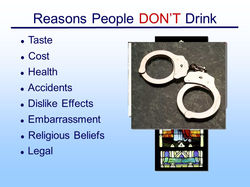DRINKING
WHAT DO I NEED TO KNOW ABOUT DRINKING?
We're supposed to be keeping an eye on how much we drink, but how many of us really know what a unit of alcohol is?
With so many different drinks and glass sizes, from shots to pints – not to mention bottles – it's easy to get confused about how many units are in your drink. Knowing your units will help you stay in control of your drinking.
-
To keep health risks from alcohol to a low level if you drink most weeks:
-
men and women are advised not to drink more than 14 units a week on a regular basis
-
spread your drinking over 3 or more days if you regularly drink as much as 14 units a week
-
if you want to cut down, try to have several drink-free days each week
WHEN DO I NEED TO SEEK SUPPORT?
Realising you have a problem with alcohol is the first big step to getting help. You may need help if:
-
you often feel the need to have a drink
-
you get into trouble because of your drinking
-
other people warn you about how much you're drinking
-
you think your drinking is causing you problems
A good place to start is with a GP. Try to be accurate and honest about how much you drink and any problems it may be causing you.
If you have become dependent on alcohol, you will have found it difficult to fully control your drinking in some way. So you'll probably need some help either to cut down and control your drinking or stop completely and also some plans to maintain the improvement after that.
The GP may suggest different types of assessment and support options available to you, such as from local community alcohol services. If you have become physically dependent and need to stop drinking completely, stopping overnight could be harmful. You should get advice about this and about any medications you may need to do this safely.
SHORT-TERM RISKS OF ALCOHOL MISUSE:
The short-term risks of alcohol misuse include:
-
accidents and injuries requiring hospital treatment, such as a head injury
-
violent behaviour and being a victim of violence
-
unprotected sex that could potentially lead to unplanned pregnancy or sexually transmitted infections (STIs)
-
loss of personal possessions, such as wallets, keys or mobile phones
-
alcohol poisoning – this may lead to vomiting, fits (seizures) and falling unconscious
-
People who binge drink (drink heavily over a short period of time) are more likely to behave recklessly and are at greater risk of being in an accident.
LONG-TERM RISKS OF ALCOHOL MISUSE:
Persistent alcohol misuse increases your risk of serious health conditions, including heart disease, stroke, liver disease, liver cancer, bowel cancer, mouth cancer, breast cancer, and pancreatitis.
As well as causing serious health problems, long-term alcohol misuse can lead to social problems for some people, such as unemployment, divorce, domestic abuse and homelessness. If someone loses control over their drinking and has an excessive desire to drink, it's known as dependent drinking (alcoholism).
Dependent drinking usually affects a person's quality of life and relationships, but they may not always find it easy to see or accept this. Severely dependent drinkers are often able to tolerate very high levels of alcohol in amounts that would dangerously affect or even kill some people.
WHAT CAN HELP?
'Self-help' tips don't solve the issue. However, they can help you/others feel more in control when experiencing strong emotions.
If you find that 'self-help' isn't enough, consider reaching out to a counsellor or your GP for help managing overwhelming emotions.
01
Make a plan and set a limit on how much you are going to drink . It may help to only have a fixed amount of money to spend on drinks if you are going out for the evening
02
Take it a day at a time and cut back a little each day. Maybe you have a smaller drink or use a smaller glass. Or try swapping your drinks to lower strength ones.
03
Try alternating your drinks. So for each glass of alcohol you follow it with a glass of water. This will also help you to stay hydrated.
04
Try and have several drink free days each week.
05
Make sure that you eat before drinking and during as well.
06
Change your social habits. Meeting up with others doesn't have to revolve around drinking. Find other activities to do together.grab a coffee, meet for breakfast or go out together and take part in physical exercise.
07
Don't use alcohol as a stress reliever or as something to lighten your mood. Alcohol is a known depressant and the after effects will leave you feeling worse than before.
08
If you are worried about yours or someone else's levels of drinking, reach out and speak to people. GP or support groups within college or the workplace. Lean on your friends to help and support you through.
09
Educate yourself on your units and understand what you have been consuming. It can be shocking to see how much you do consume in a day/night especially when you are pouring ‘home’ measures.
10
Try to replace unhealthy drinks such as alcohol and energy drinks with healthier ones. The health benefits are huge and you will notice the difference. Having the ‘hair of the dog’ or filling up on energy drinks to keep you going, will result in bigger problems over time and are the underlying reason why you have little to no energy and have difficulties with sleep.
EXTERNAL INFORMATION, SUPPORT AND ADVICE






















































 |  |  |
|---|---|---|
 |  |  |
 |  |  |
 |  |  |
 |  |  |
 |  |  |
 |  |  |
 |  |  |
 |  |  |
 |  |  |
 |  |  |
 |  |  |
 |  |  |
 |  |  |

